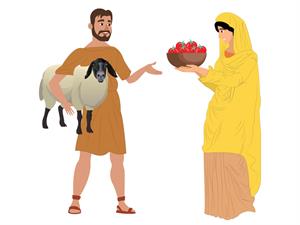PDF chapter test TRY NOW
The Origin of Barter System:
Early humans roamed around the world, started hunting and gathering animals for their food and sustenance. They slowly began to settle along the banks of the riverside settlements called “Villages” and performed agriculture.
This agriculture system allowed them to grow crops according to their basic needs. Not every place is ideal for crop production as it depends upon various factors like climate, soil, water availability etc.

Barter System
People began to produce crops that were suitable according to their location. This limited crop production. When they needed other vegetables which couldn’t be grown in their areas, they preferred exchanging goods.
Barter System: This was the oldest economy followed by people before the advent of money. According to their needs, people of one area exchanged goods (food, clothes, animals) with other areas.
The Barter system functions under the principle of “Mutual requirement” (For example: If a person has surplus wheat and the other person has surplus rice, the person having rice must be willing to buy wheat and vice-verse, otherwise, the Barter system is not applicable)
1. Easily appealing to the Commoners.
2. Trust-based exchange of goods.
3. Applicable to all goods produced by the countries.
Disadvantages of the Barter System:
1. Double coincidence of wants for the goods.
2. Demanding more goods for exchange.
The Advent of Money:
The Barter system faced issues like non-wanting of another commodity from people, which made them think about the alternate course of exchange. This need made them invent “Money”.
Mesopotamia: The written records found in the 3^{rd} century BCE in Mesopotamia was the first record of the presence of money. The Mesopotamian civilisation also had a sound knowledge regarding financial structure, as they used silver as a standard value. Mesopotamia is the ancient name of Modern-day Iraq.
The invention of money altered the course of the economy across the world, where people began to use money as a standard value of exchange.
